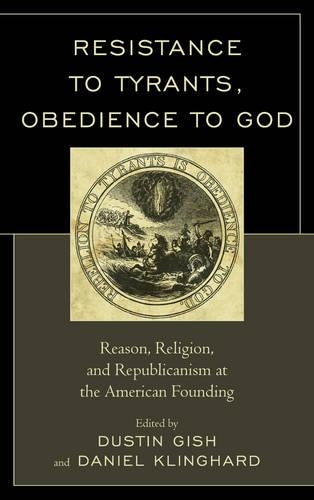
Resistance to Tyrants, Obedience to God: Reason, Religion, and Republicanism at the American Founding
(Paperback)
Publishing Details
Resistance to Tyrants, Obedience to God: Reason, Religion, and Republicanism at the American Founding
By (Author) Dustin A. Gish
Edited by Daniel P. Klinghard
Contributions by Jeffrey A. Bernstein
Contributions by Maura Jane Farrelly
Contributions by Robert Faulkner
Contributions by Matthew Holbreich
Contributions by Jonathan Israel
Contributions by Peter McNamara
Contributions by Carla Mulford
Contributions by Vincent Philip Muoz
Bloomsbury Publishing PLC
Lexington Books
25th March 2015
United States
Classifications
Professional and Scholarly
Non Fiction
Social and political philosophy
Political science and theory
320.10973
Physical Properties
Paperback
272
Width 152mm, Height 227mm, Spine 20mm
408g
Description
Both reason and religion have been acknowledged by scholars to have had a profound impact on the foundation and formation of the American regime. But the significance, pervasiveness, and depth of that impact have also been disputed. While many have approached the American founding period with an interest in the influence of Enlightenment reason or Biblical religion, they have often assumed such influences to be exclusive, irreconcilable, or contradictory. Few scholarly works have sought to study the mutual influence of reason and religion as intertwined strands shaping the American historical and political experience at its founding. The purpose of the chapters in this volume, authored by a distinguished group of scholars in political science, intellectual history, literature, and philosophy, is to examine how this mutual influence was made manifest in the American Foundingespecially in the writings, speeches, and thought of critical figures (Thomas Paine, Benjamin Franklin, George Washington, Thomas Jefferson, James Madison, Alexander Hamilton, Charles Carroll), and in later works by key interpreters of the American Founding (Alexis de Tocqueville and Abraham Lincoln). Taken as a whole, then, this volume does not attempt to explain away the potential opposition between religion and reason in the American mind of the late eighteenth- and early nineteenth- centuries, but instead argues that there is a uniquely American perspective and political thought that emerges from this tension. The chapters gathered here, individually and collectively, seek to illuminate the animating affect of this tension on the political rhetoric, thought, and history of the early American period. By taking seriously and exploring the mutual influence of these two themes in creative tension, rather than seeing them as diametrically opposed or as mutually exclusive, this volume thus reveals how the pervasiveness and resonance of Biblical narratives and religion supported and infused Enlightened political discourse and action at the Founding, thereby articulating the complementarity of reason and religion during this critical period.
Reviews
Was America a city upon a hill, or was it just a skirmish in the larger battle between Ancients and Moderns The essays in this volume reject these familiar alternatives and propose a third way. In so doing, they contribute to our growing understanding of the Enlightenment while at the same time forcing us to consider early American political thought in its own terms. Gish and Klinghard have put together a volume that should be essential reading for students of the early republic and for students of the Enlightenment. -- Jeremy D. Bailey, professor of political science, University of Houston
Author Bio
Dustin Gish teaches ancient, early modern, and American constitutionalism in the Institute for the American Constitutional Heritage at the University of Oklahoma. He has published articles, book chapters, review essays, and reviews on topics in the history of political philosophy on the political thought of Homer, Xenophon, Plato, William Shakespeare, and Thomas Jefferson. His work has appeared in The Journal of Politics, History of Political Thought, Perspectives on Political Science, Polis, The Review of Politics, and Bryn Mawr Classical Review. He is also contributing co-editor of two volumes on Shakespeares political thought (Souls With Longing: Representations of Honor and Love in Shakespeare and Shakespeare and the Body Politic), and of The Political Thought of Xenophon. Daniel Klinghard is associate professor of political science at the College of the Holy Cross in Worcester, Massachusetts, where he teaches American national government. He is the author of The Nationalization of American Political Parties, 1880-1896 (Cambridge University Press, 2010), which was awarded the Leon D. Epstein Outstanding Book Award by the Political Parties and Organizations section of the American Political Science Association. He has published in Presidential Studies Quarterly, Polity, and The Journal of Politics.
